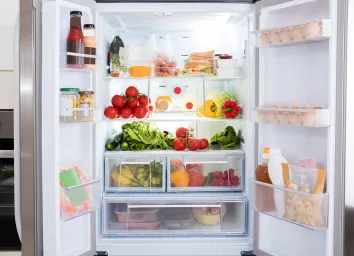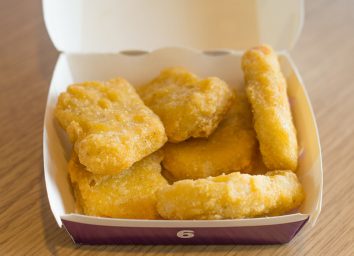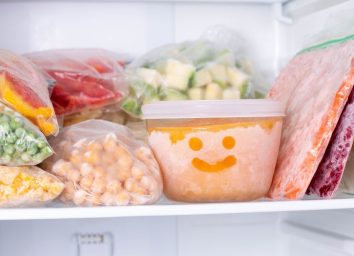This Is How Long You Can Store Chicken in the Freezer

It may seem like frozen food can last forever, but the reality is that everything has a shelf life. And while freezing can definitely extend the life of produce, meat, and other food products you want to preserve before they spoil, all good things do come to an end. Still, on busy weeknights when you need to whip something up using ingredients you already have, you may find yourself rooting around in your freezer drawer, looking for that frozen chicken you remember stashing in there last month…or was it last year?
Increased inflation rates currently impacting grocery costs will only make tossing out your inedible, freezer-burned products a more bitter pill to swallow. In fact, data from the U.S. Bureau of Labor Statistics reveals that the cost of poultry products has risen by nearly 3o% over the last decade. So of course you want your frozen chicken to be in tip-top shape when you're ready to eat it. But how long can chicken be frozen before it takes a turn for the worse?
Fortunately, the U.S. Department of Health & Human Services website FoodSafety.gov provides fairly comprehensive guidelines on the amount of time various types of foods can be safely stored in your freezer before the texture, taste, and all-around quality start to degrade. While this data is quite helpful in terms of providing a solid ballpark estimate for how long you can safely store raw chicken in the freezer, we wanted to provide a little more colorful context with the help of some food and culinary experts.
Whether you're freezing your bird in pieces or are storing a whole chicken, keep reading to learn more about how long frozen chicken can last in the freezer—and next, check out Here's How Long Eggs Last—and How to Tell If They're Bad.
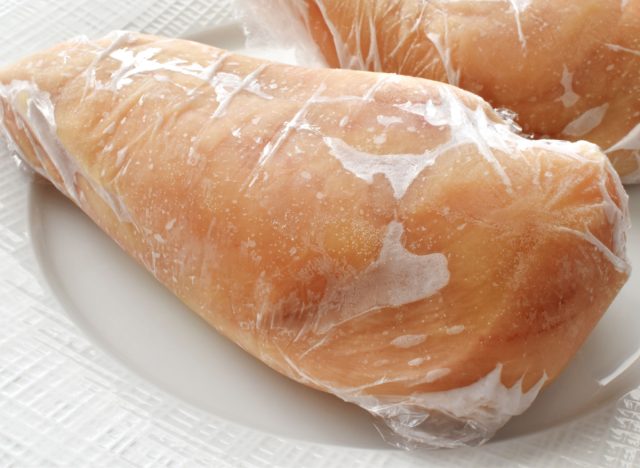
How long does raw chicken last in the freezer?
Although FoodSafety.gov claims that you can safely store frozen chicken pieces (i.e., thighs, wings, breasts, legs) for up to about nine months in a standard freezer and whole chickens for up to a year, the quality and taste of your bird can still decline faster than you might think.
"You can freeze chicken up to two months before seeing significant changes in texture and flavor of chicken," says Thomas Tilaka Kalb, the executive chef of Agnes Restaurant & Cheesery.
However, if you have a more high-tech freezer situation and can adjust the temperature to run at 0 °F or below, according to the U.S. Department of Health & Human Services, you can technically store poultry or any frozen food in your freezer indefinitely. Chef Kalb affirms this.
"Technically, raw chicken—if properly wrapped and stored correctly—is preserved almost indefinitely," says Chef Kalb. "But you never want to freeze anything for more than two months. After that, you see a massive degradation in flavor and texture."
Dr. Bryan Quoc Le, Ph.D., food scientist and author of 150 Food Science Questions Answered, agrees. "So long as the chicken was not contaminated and properly handled before frozen, chicken is indefinitely safe to eat after freezing if the chicken is continuously frozen before use," says Dr. Bryan Quoc Le. He also notes that "raw chicken will last up to one year in the freezer before significantly deteriorating in quality."
What are easy best practices for freezing chicken and keeping it fresh?
"Only freeze fresh meat, freezing will never reverse any growth of harmful bacteria," advises Chef Kalb. "Make sure to wrap the chicken tightly and place it in an airtight container or bag."
"When freezing chicken, I first wrap it tightly in plastic wrap. I follow that with a layer of aluminum foil to prevent freezer burn," explains Maggie Turansky, recipe developer and head of No Frills Kitchen. "I then like to put it in a resealable freezer bag and make sure all of the air is removed before labeling and dating it."
How can you tell if your frozen chicken is still good?
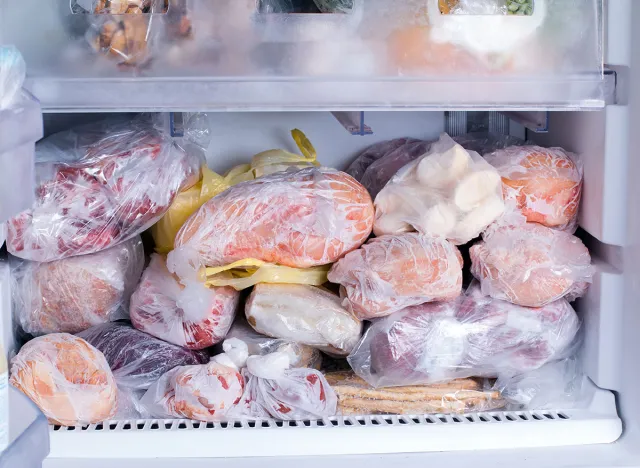
"As with any inspection of the safety of meat, you want to rely on your senses," suggests Chef Kalb. "Visually inspect the product and make sure there is no discoloration, then smell the product once it is thawed. If there are no concerning aromas, continue to feel the product to make sure none of the edges are firm or dried out due to freezer burn.
"After thawing, if the chicken looks and smells normal, it's probably safe to eat," adds Jessica Randhawa, head chef and owner of The Forked Spoon. "However, if the thawed chicken looks or smells off or [you doubt] its safety, it's best to discard it and move on."
Dr. Quoc Le has a more scientific take: "Pathogenic microorganisms cannot grow at freezing temperatures, but any microorganisms that were already present on the chicken before freezing will remain viable after defrosting. Chicken that shows signs of freezer burn, such as dry or dull gray spots, has had its taste, flavor, and quality significantly compromised." In other words, you get out what you put in. If the chicken has already started to turn by the time you freeze it, don't expect it to miraculously recover when it thaws three months later.
What's the best way to prevent freezer burn on chicken?
"Freezer burn, caused by dehydration and oxidation of the chicken's surface, can affect the texture and taste of the chicken," explains Randhawa. "It can build up after about 9+ months if the chicken is stored correctly. [Although] freezer burn does not make chicken unsafe to eat, it does affect its texture and quality."
"Chicken can be wrapped in one layer of plastic wrap, a second layer of aluminum foil, and placed in a ziplock bag," Dr. Quoc Le suggests.
"The best way to prevent freezer burn on chicken is to ensure that there are no tears or air bubbles in the wrapping of the product," says Chef Kalb. "If you have a home vacuum-seal machine or hand pump, that is always preferred."
"The less oxygen is available to oxidize the surface of the chicken, the better for reducing freezer burn," says Dr. Quoc Le.

